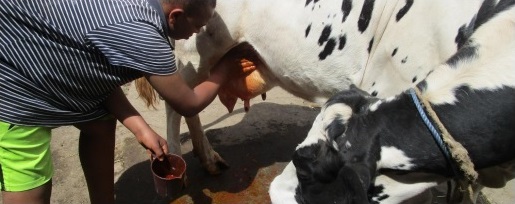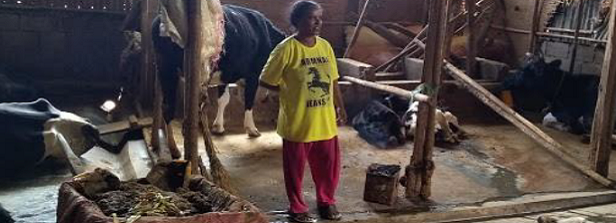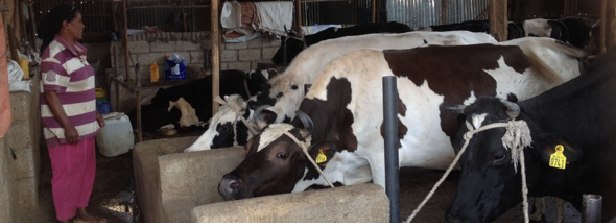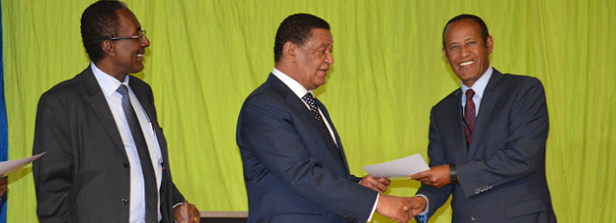Enhancing safety and quality of milk in Ethiopia
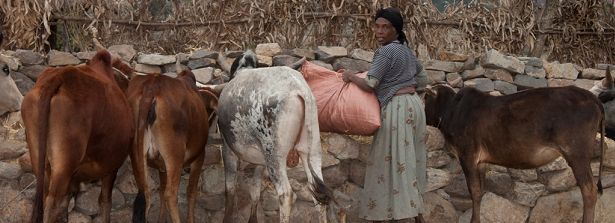
Duration: 03 July 2017 to 01 October 2020
Project information
Aim: This project “Healthy Cows – Healthy Food – Healthy Environment: Enhancing safety and quality of milk in Ethiopia with a focus on antibiotic residues” aims at enhancing milk quality and the position of women in dairy farming in Ethiopia. The project will implement and embed the best practices worldwide for producing healthy milk in Ethiopia. Using Ethiopean experience in community based breeding systems to develop a more resilient cow, using Indian knowledge of medicinal herbs for reduction of the use of antibiotic to enforce Ethiopean ethnoveterinary knowledge, educate women to tend herbal gardens to make herbal remedies for extra income and using training of trainers in residue analysis from the Netherlands to set up a National training facility for residue analysis.
Objectives: This is a collaboration project towards a system change in dairy farming in Ethiopia, in which the dominant focus on increasing milk quantity for the growing population is strategically combined with improving milk quality – and involving women in tending animals health by using herbal remedies. The overall goal of this proposal therefore is: To enhance safety and quality of milk in Ethiopia through applied research & capacity building at four levels:
- Empowering of women to get income out of herbal gardens selling herbs to improve animal health leading to production of residue-free milk, and,
- Training of trainers for milk quality control,
- Establishing baseline data on residues and
- Raising awareness on AMR.
The project aims to stimulate innovation by: (1) piloting the Centre of Expertise for Natural Livestock Farming (NLF) strategy to produce milk without chemical residues and (2) strengthening the capacity for milk quality control (3) empowering women to grow and process herbs for remedies to heal cattle and reduce the use of antibiotics.
Method: Improving milk quality is done through education (training of trainers) and implementing of appropriate milk quality testing techniques and is combined with data gathering and field-pilots with a strategy towards producing residue-free milk. Growing medicinal herbs which can supply extra income for women will be used to reduce the use of antibiotics. Both processes, and the inter-linkages between them, will require a minimum of three years. Co-creation of knowledge and sciences is achieved through interaction between farmers’ and scientists within Ethiopia, Netherlands and India.
Country: Ethiopia.
Dutch policy goals: Promoting inclusive and sustainable growth in the agricultural sector; Creating ecologically sustainable food systems.
Progress reports
Year 1: At community level a participatory base line on cattle health management in the two selected peri-urban communities revealed extremely high mortality rates among calves (average 73% and 56%), with mortality of adult cows at 16% and 18%. Calf death occurs especially at (very) young age due to weakness and diarrhea – with calf blindness as an additional symptom. A more detailed study is in progress to register the severity of these at individual farmers. High mortality rates are linked to problems in cattle feeding and management: the animals are kept indoors, tied with very limited space, problems with water and feed quantity and quality, as well as general hygiene. The continued crossbreeding with Holstein-Friesian cattle seems to further enhance this problem. Use of antibiotics in these communities is currently relatively low, due to lack of veterinary services. Meanwhile, the frequent contamination of cattle feed with Aflatoxines may be one of the underlying causes of cattle mortality encountered. The rapid growth of veterinary colleges (1 ->10) may result in too many practitioners in the future, which is expected to cause rise in antibiotic use – while currently no control system on residues is in place. At the government laboratory staff and good equipment are available, while there is noted lack of experience with routine sampling and control on antibiotic residues. In the coming weeks lab personnel will be trained on residue analysis at RIKILTWUR.

